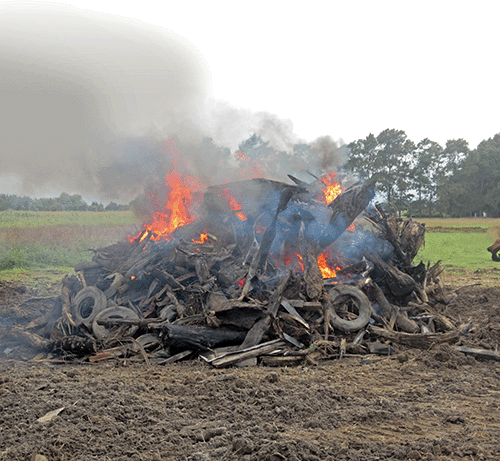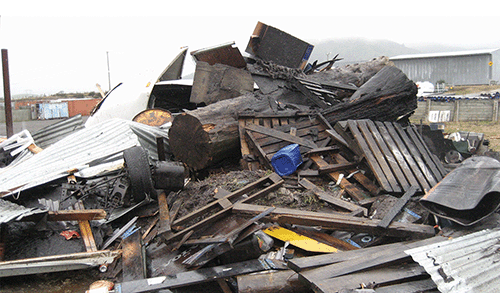Outdoor burning and air quality
Outdoor burning activities cause air pollution – a major problem in some parts of the Waikato region. It can damage our health and result in unpleasant smells, tainted roof water supplies, blemished crops, and soiled washing and surfaces.
You can help reduce air pollution from outdoor burning. Understand its effects, and the law.
Smoke harms us

There are three different types of outdoor burning:
- industrial site waste burning
- backyard fire
- vegetation/forestry burnoff.
Smoke from these burning activities contains fine particles (PM10) and dioxins that can make us sick and even cause premature death.
Fine particles (PM10)
Ambient PM10 concentrations currently exceed national standards in a number of towns in our region. Up to 23 per cent of the PM10 emissions comes from outdoor burning at certain times of the year.
The dispersion of the smoke also affects the amount of PM10 found. For example, outdoor burning generally does not effectively distribute PM10 compared to the high chimneys used by industry. So outdoor burning’s contribution to pollution could be higher at times.
In some urban areas of New Zealand outdoor burning is prohibited because of these impacts. Presently, emissions from outdoor burning including burning of vegetation from land clearing operations (“pine to pasture”) are permitted under the Waikato Regional Plan, subject to compliance with conditions that essentially control nuisance.
Should there be significant adverse effects, then potentially there is a breach of the Waikato Regional Plan. Noticeable levels of smoke over wide areas, especially urban areas, can cause adverse health effects and impact a large number of people. Localised concentrated plumes of smoke may also cause health effects and cause nuisance.
Dioxin
Dioxin is extremely toxic and it is widely assumed from animal studies that dioxin has the potential to cause neurobehavioural, developmental, reproductive and immunotoxic effects, and cancer.
A major portion of the dioxin that enters the body of the typical New Zealander originates as a discharge to air and is eventually ingested in meat and dairy products. The second largest source of dioxin discharges to air after landfill fires is from the burning of waste in “44-gallon drums” or in backyard fires.
Combustion gases from uncontrolled burning of mixed household waste can contain high levels of dioxin. Therefore an effective way of reducing the discharge of dioxins to air is to avoid burning household wastes by separating them out from garden vegetation and untreated wood prior to having a fire.
Better burning
Waikato Regional Council's preferred options for solid waste disposal are recycling, composting or via waste transfer stations.
However, if burning solid waste is your only option, then reduce smoke and burn safely and considerately:
- Make smaller fires.
- Make sure fuel is dry and loosely stacked.
- Make sure the fire does not smoulder.
- Check that the wind is predicted to be away from built up areas for the duration of the fire.
- Postpone lighting your fire if it's likely there will already be smoke from other fires in the air.
- Burn as far from your property boundary as possible
- Avoid burning in the late afternoon or evening. Breezier daytime conditions help disperse smoke.
- Be prepared to put the fire out if conditions change or you discover that you are causing a nuisance.
What you can't burn
 Do not attempt to burn:
Do not attempt to burn:
- halogenated organic chemicals
- materials containing heavy metals
- pitch, paint and paint residues and surface coatings
- asbestos
- pathological waste (excluding animal carcasses on production land)
- agrichemicals and agrichemical containers containing residues
- polyvinylchloride (PVC) plastic and plastics containing halogenated material
- copper-chrome-arsenic (CCA) treated timber or timber treated with organochlorine (PCP)
- rubber and tyres
- waste oil and other waste petroleum products including sludge
- sludge from industrial processes
- hazardous materials from contaminated sites and buildings
- materials associated with the recovery of metals from cables
- components of motor vehicles
- tar and bitumen
- any material within a landfill or a refuse transfer station.
Outdoor burning of these materials is prohibited under the Waikato Regional Plan. This is because burning increases their capacity to produce harmful contaminants that may cause serious health effects in people and animals, such as cancers, respiratory disease and birth defects.
Enforcement
Breaches of the outdoor burning rules can result in enforcement action being taken by Waikato Regional Council. These actions include $300 and $1000 infringement notices for domestic and industrial/trade premise breaches respectively and for more serious breaches maximum penalties or fines of up to $300,000 for a natural person, up to $600,000 for a non-natural person (e.g. a company) and/or up to two years in prison can apply.
Let's talk outdoor burning - PDF brochure
The information on this page is also available as a printable PDF brochure, below.
District council rules and contacts
Note that burning may be separately controlled in District Plans. Often in summer it is banned or requires a fire permit. To find out more about your local rules, contact your district council.
| Name | Contact numbers |
| Hamilton City Council | 07 838 6699 |
| Hauraki District Council | 07 862 8609 |
| Matamata Piako District Council | 07 884 0060 |
| Ōtorohanga District Council | 07 873 8199 |
| South Waikato District Council | 07 885 0340 |
| Taupō District Council | 07 376 0899 |
| Thames Coromandal District Council | 07 868 0200 |
| Waikato District Council | 07 824 8633 |
| Waipā District Council | 07 823 3800 |
| Waitomo District Council | 07 878 0800 |

